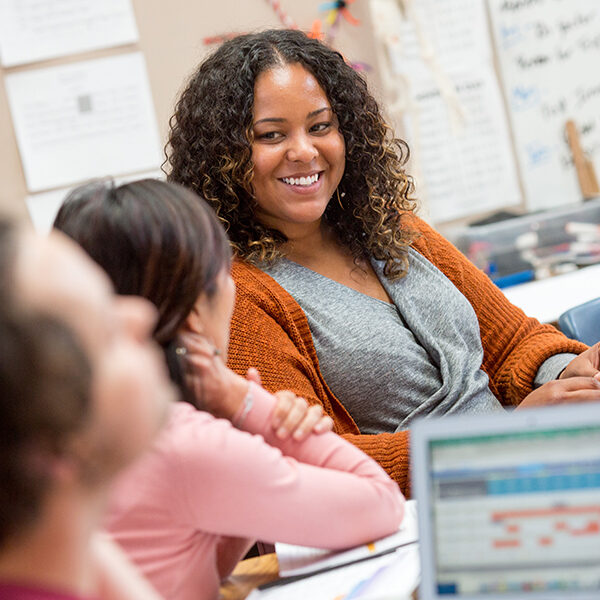
Photo courtesy of Allison Shelley/The Verbatim Agency for American Education: Images of Teachers and Students in Action (CC BY-NC 4.0).
“I am a returning teacher after leaving my own classroom in 2003. So much has changed since I earned my teaching degree in 1995! I want and need to learn to incorporate technology into my practice to stay relevant, but also to become more efficient and to have fun with my students as we learn together. With large classes (and classes of any size), I cannot work with every child at every moment. I see blended learning as a method to multiply my ability to work with students one-on-one both in person and virtually.” – Vancouver Public Schools Teacher in Blended Learning Professional Development Series, 2018.
At the conclusion of our Blended Learning Professional Development Series, offered to educators in a partnership between Relay Graduate School of Education (Relay GSE) and Vancouver Public Schools, 37 teachers who were new to blended learning showcased their robust classroom pilots that included playlists, flipped lessons, choice boards, station rotation groups, and student-led goal cycles. While the range of approaches reflected the varying academic needs of the students who spanned grade levels and subject areas, there were several commonalities that emerged: all approaches were implemented with carefully planned and practiced routines and procedures, and all embraced an aim to increase opportunities for student ownership and agency. To the latter goal, a theme of data-driven learning emerged, where students empowered by access to their own data could make informed choices to direct their own learning. Over 80% of the participants expressed a strong belief in blended learning as a tool to increase student achievement, and 95% were confident they could continue to refine and iterate on their blended learning models.
How were teachers new to blended learning able to get so far, so fast, with only a few hours of seat time? The answer was in the design of the district’s new and innovative approach to professional learning that modeled blended learning best practices and personalized the adult learning experience by including self-paced online modules, differentiated in-person sessions, and a project-based approach that prompted classroom application.
Reimagining Professional Development
With 20,000 devices deployed to students and teachers at Vancouver Public Schools and a goal of personalizing learning for every student, we wanted to provide more training for teachers to support the implementation of blended learning models in their classrooms. Our primary challenge was the assumption that supporting a shift to impactful blended learning seemed too big of a task within the traditional mode of allotted seat time for PD. Furthermore, we were concerned that a stand-and-deliver approach would not as effectively model the learner-centered shifts we hoped teachers would be able to apply to their own classrooms.
While browsing for ideas on TLA’s Blended & Personalized Learning At Work platform, we came across Relay GSE’s free blended learning courses. Our team of coaches initially completed the courses and were impressed with the concrete examples about how to gradually get started with blended. We reached out to Jeff Starr, Relay GSE’s Director of Personalized Learning, to brainstorm ideas around how to best leverage the courses for our teachers, and he committed to collaborating on the design of a professional development experience like we had never seen before. While the courses on their own provided context and a wealth of valuable strategies, we knew collaborating on designing data and integrating in-person sessions with the courses, along with a project-based application, would take learning to the next level.
Modeling Best Practices
After securing district support to award PD credits for online work for the first time, we designed the professional learning series to span two months, with three in-person sessions interspersed with self-paced online courses that teachers could complete at their own pace. Interactive discussions and embedded assignments within the course gave us insights into how each teacher was progressing along while illuminating the common questions and challenges that emerged. We used these interactions to tailor our in-person sessions to different needs by modeling small group rotations. We also included a project-based application that gave teachers flexibility when implementing blended learning pilots with their students along the way – allowing them to try strategies, get feedback, and receive support from their cohort and instructors.
For our final session, teachers came ready to share their blended learning journey via a gallery walk showcase. The energy and buzz in the room was palpable as teachers shared results from their pilots, highlighting both their “flops” and big successes. View a video compilation from the VPS teachers’ PD showcase. Much like what we wish for our students and their learning, each teacher had developed a unique understanding of blended learning and how it best fit within their own classroom context.
Our recipe for personalizing PD through a blended approach using online self-paced blended learning courses, small group in-person sessions, and project-based learning was a stretch for all of us. The overwhelmingly positive results have pushed us to rethink our entire philosophy around professional development in our current school district system.
With any new learning, we have questions about our next steps and reflections on how we’ll scale this experience to other teachers in our district, but we feel confident that through this model, we’ve been able to accelerate the pace of developing teacher capacity, ultimately leading to a faster impact on student learning.
Opinions presented in this blog post are those of the author and do not necessarily represent TLA’s opinion, nor should be considered an endorsement by TLA of any organization or product.
